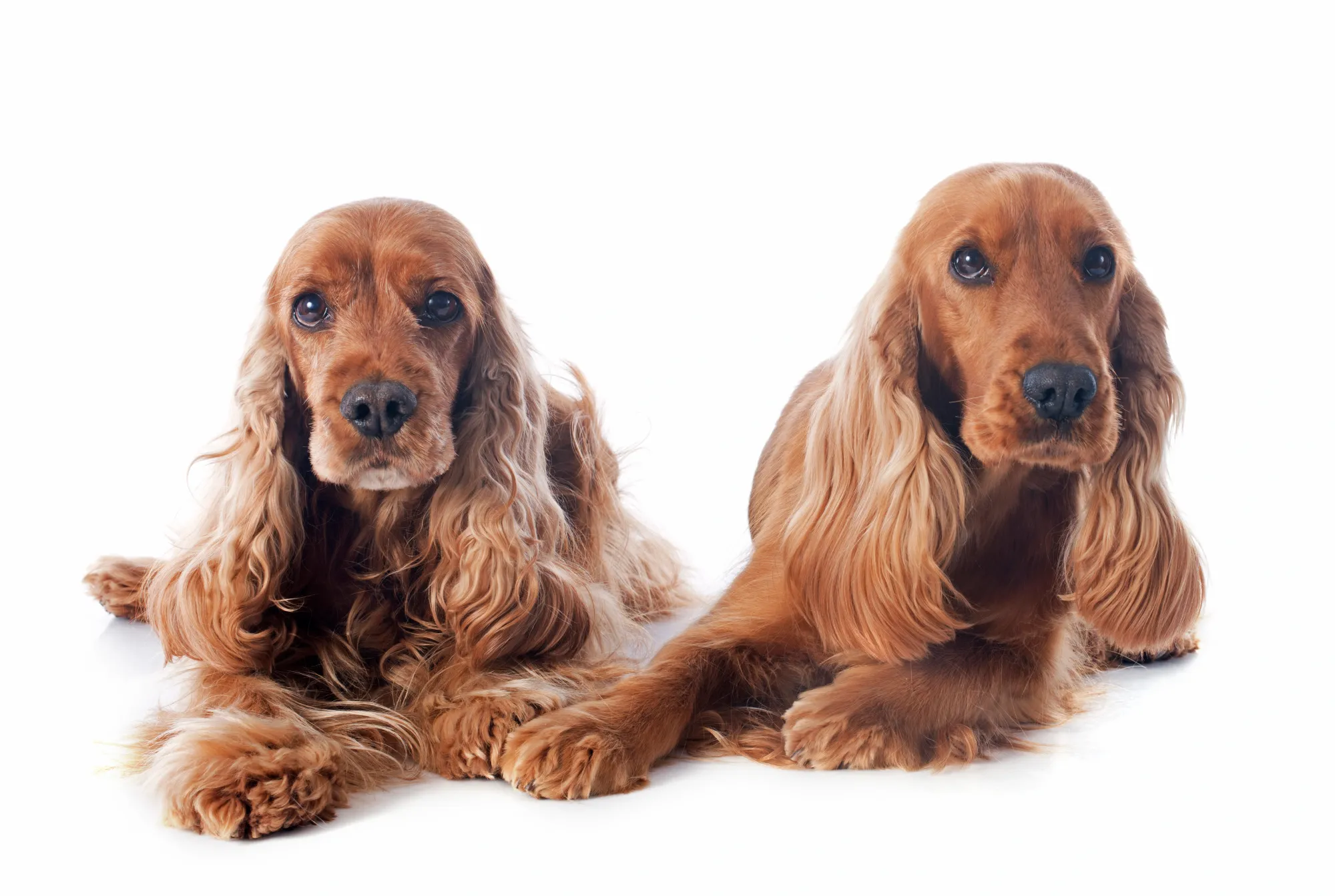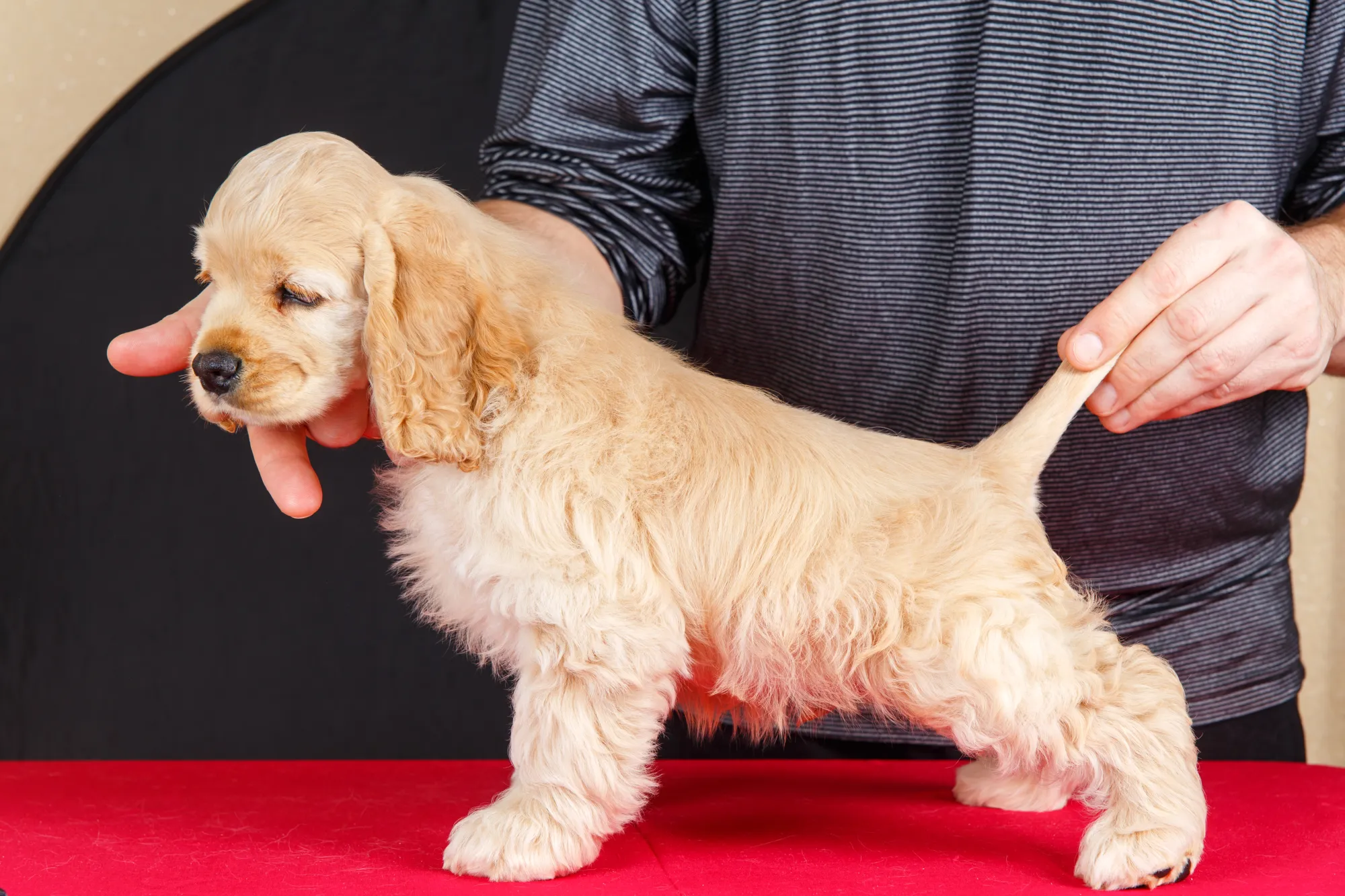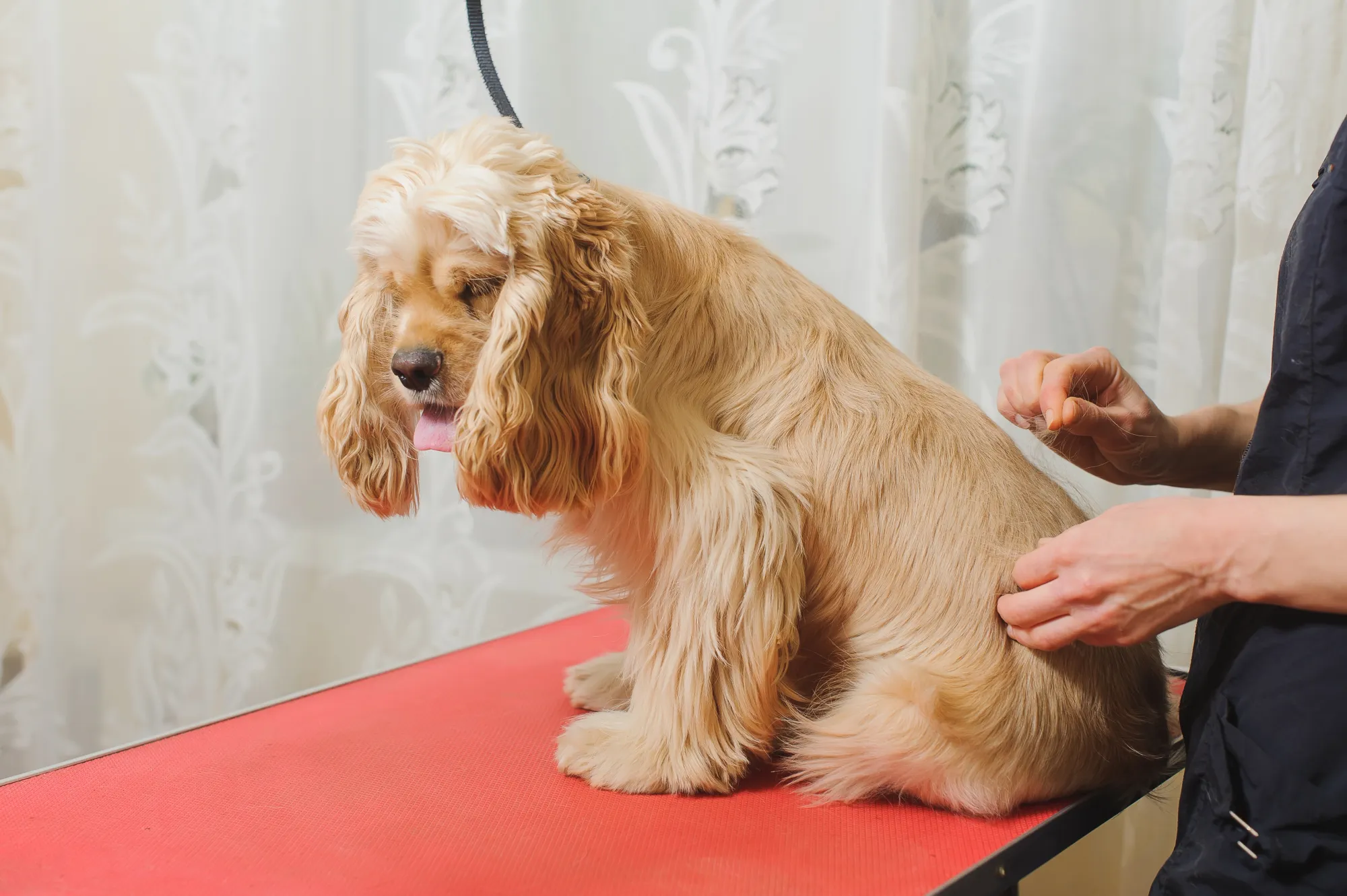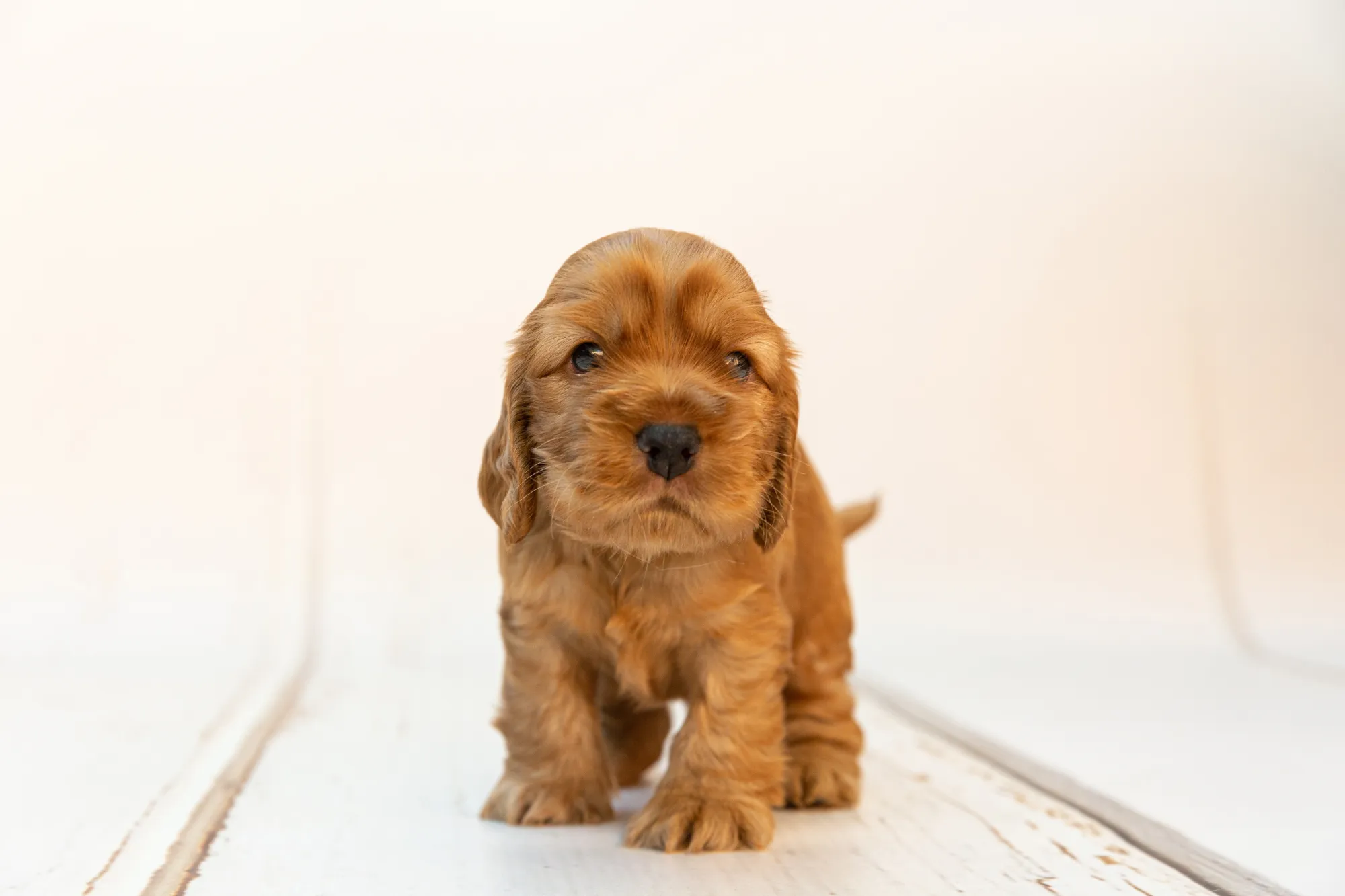The Miniature Cocker Spaniel is a popular dog breed that has gained a lot of attention in recent years due to its adorable size and charming personality. These dogs are a smaller version of the Cocker Spaniel breed, known for their long, wavy hair and big, expressive eyes. Miniature Cocker Spaniels are a great choice for families who want a loyal and affectionate pet that is easy to care for.

Despite their small size, Miniature Cocker Spaniels are known for their playful and energetic personalities. They love to play and run around, making them a great choice for families with children or other pets. These dogs are also highly intelligent and trainable, making them easy to teach new tricks and commands. Miniature Cocker Spaniels are also known for their friendly and outgoing nature, making them great companions for people of all ages.
If you are considering getting a Miniature Cocker Spaniel, it is important to do your research and find a reputable breeder. These dogs require regular grooming and exercise, so be prepared to spend time taking care of your pet. With proper care and attention, however, a Miniature Cocker Spaniel can make a wonderful addition to any family.
Breed Overview
The Miniature Cocker Spaniel is a small version of the Cocker Spaniel breed. They are known for their adorable looks and affectionate personalities. In this section, we will provide an overview of the Miniature Cocker Spaniel breed, including its history and origin, as well as the differences between the Miniature and Standard Cocker Spaniel.
History and Origin
The Cocker Spaniel breed originated in Spain in the 14th century and was primarily used for hunting birds. The breed was later brought to England, where it was further developed as a hunting dog. The English Cocker Spaniel was recognized by the American Kennel Club (AKC) in 1946, while the American Cocker Spaniel was recognized in 1878.
The Miniature Cocker Spaniel is a relatively new breed, developed by breeding the smallest dogs from a litter of purebred Cocker Spaniels. They were first recognized by the AKC in 1991.
Miniature Cocker Spaniel vs. Standard Cocker Spaniel
The Miniature Cocker Spaniel is a smaller version of the Standard Cocker Spaniel, with a height of 13-15 inches and a weight of 15-30 pounds. The Standard Cocker Spaniel, on the other hand, has a height of 15-17 inches and a weight of 20-30 pounds.
The Miniature Cocker Spaniel has a similar temperament to the Standard Cocker Spaniel, with a friendly and affectionate personality. They are also intelligent and easy to train, making them a great family pet.
In conclusion, the Miniature Cocker Spaniel is a charming and lovable breed that is perfect for families looking for a small dog with a big personality. Whether you are looking for a hunting companion or a loyal family pet, the Miniature Cocker Spaniel is a great choice.
Physical Characteristics
Size and Weight
Mini Cocker Spaniels are a smaller version of the Cocker Spaniel breed. They typically weigh between 13 and 18 pounds and stand about 10 to 14 inches tall at the shoulder. Despite their small size, they are sturdy and well-muscled.
Coat and Color
Mini Cocker Spaniels have a medium length, silky coat that is either straight or wavy. Their coat comes in a variety of colors including black, white, red, brown, and cream. Some may have a mix of two or more colors. They have long, floppy ears and a feathered tail.
Distinctive Features
One of the most distinctive features of the Mini Cocker Spaniel is their large, expressive eyes. They also have a round, domed head and a short, square muzzle. Their legs are short and sturdy, and their paws are well padded.
Overall, the Mini Cocker Spaniel is an adorable and charming breed with a distinctive appearance. They are known for their friendly and affectionate personalities, making them great family pets. However, it is important to note that they do require regular grooming and attention to their coat to prevent matting and shedding.
Temperament and Behavior
Personality
Mini Cocker Spaniels are known for their gentle, fun, and playful personalities. They thrive on attention and love to be around their family. They are energetic and loyal, making them great family pets. They are also easy to train, which makes them a popular choice for first-time dog owners.
Family Compatibility
Mini Cocker Spaniels are great family pets and are well-suited for families with children. They are gentle and patient with children, making them a great choice for families with young kids. They are also good with other pets, including cats and other dogs.
Socialization Needs
Socialization is important for Mini Cocker Spaniels. They need to be exposed to different people, animals, and environments from a young age to help them develop into well-adjusted adults. They can be prone to destructive behavior if they are not properly socialized.
Overall, Mini Cocker Spaniels are great family pets with a fun and playful personality. They require attention and socialization to thrive, but they are easy to train and make a great addition to any family.
Health and Care

Common Health Issues
Mini Cocker Spaniels are generally healthy dogs, but like all breeds, they are prone to certain health issues. One of the most common problems among Cocker Spaniels is ear infections. It is important to keep their ear canals clean and dry to prevent infections. Regular grooming and cleaning of the ears can help prevent this issue.
Another health concern in Cocker Spaniels is hip dysplasia. It is a condition where the hip joint does not develop properly, leading to arthritis and pain. Regular check-ups with a veterinarian can help detect this issue early, and a healthy diet and regular exercise can help prevent it.
Diet and Nutrition
Mini Cocker Spaniels require a well-balanced diet to maintain their health. Feeding them high-quality dog food that is rich in minerals and nutrients is essential. Overfeeding can lead to obesity, which can cause various health problems. It is important to monitor their weight and adjust their diet accordingly.
Exercise Requirements
Mini Cocker Spaniels are active dogs and require regular exercise to keep them healthy. They enjoy walks, playtime, and other activities that keep them engaged and active. It is important to provide them with enough exercise to prevent boredom and destructive behavior. Regular exercise also helps maintain their weight and prevents health problems associated with obesity.
Hygiene and Grooming
Mini Cocker Spaniels require regular grooming to keep their coat healthy and shiny. Regular brushing and bathing are essential to maintain their hygiene. It is important to clean their ears regularly to prevent infections and to trim their nails to prevent overgrowth. Regular grooming not only keeps them looking their best but also helps prevent health problems.
Grooming and Maintenance

Grooming Needs
Mini Cocker Spaniels require regular grooming to maintain their coat's health and appearance. Their long, silky coat is prone to matting and tangling, which can cause discomfort and skin irritation. Brushing their coat at least twice a week with a slicker brush can help prevent matting and remove loose hair. It is also essential to regularly trim their nails and clean their ears to prevent infections.
Shedding and Allergies
Mini Cocker Spaniels are moderate shedders, and their hair can trigger allergies in some people. However, regular grooming can help minimize shedding and reduce the amount of hair in the home. Brushing their coat regularly can also help distribute natural oils, keeping their coat healthy and shiny.
Bathing and Cleaning
Mini Cocker Spaniels should be bathed every four to six weeks to keep their coat clean and healthy. Use a mild dog shampoo and avoid getting water in their ears, which can cause infections. After bathing, dry their coat thoroughly to prevent matting and tangling.
Regular grooming and maintenance are essential for keeping Mini Cocker Spaniels healthy and comfortable. With proper care, their long, silky coat can be a beautiful and enjoyable feature of this beloved breed.
Training and Activities
Training Techniques
Mini Cocker Spaniels are intelligent and easy to train dogs. Positive reinforcement techniques such as treats, praise, and playtime work best for this breed. Harsh training methods should be avoided as they can lead to fear and anxiety in the dog. Early socialization is crucial to ensure they are well-behaved and friendly around other dogs and people.
Mental Stimulation
Mini Cocker Spaniels are hunting dogs and enjoy mental stimulation activities such as puzzle toys, hide-and-seek games, and scent work. These activities keep them mentally stimulated and prevent boredom, which can lead to destructive behavior.
Suitable Activities
Mini Cocker Spaniels require regular exercise and attention. A daily walk or playtime in the park is essential to keep them healthy and happy. They also enjoy activities such as swimming, hiking, and agility training. It is important to note that they are not high-energy dogs and do not require intense physical activity.
In conclusion, training and activities are crucial for the well-being of Mini Cocker Spaniels. With positive reinforcement techniques and mental stimulation activities, they can be easily trained and kept mentally stimulated. Regular exercise and attention are also essential to keep them healthy and happy.
Breeding and Genetics

Genetic Considerations
When it comes to mini Cocker Spaniels, there are a few genetic considerations to keep in mind. One of the most important is dwarfism, which can occur in this breed. It is caused by a genetic mutation that affects bone growth, leading to shorter legs and other physical deformities. Reputable breeders should always screen their breeding dogs for this mutation to avoid producing puppies with dwarfism.
Another consideration is the possibility of runts in a litter. Runts are puppies that are smaller and weaker than their littermates and may have a higher risk of health problems. Breeders should take care to ensure that runts receive proper nutrition and medical care to give them the best chance of survival.
Breeding Practices
When breeding mini Cocker Spaniels, it is important to follow ethical and responsible breeding practices. This includes genetic testing and screening to avoid passing on any hereditary health conditions or physical deformities. Breeders should also prioritize the health and well-being of their dogs, ensuring that they receive proper nutrition, exercise, and medical care.
Unethical breeding practices, such as overbreeding or breeding dogs with known health issues, can lead to serious health problems in puppies. It is important for prospective buyers to do their research and choose a reputable breeder who follows ethical breeding practices.
It is also worth noting that growth hormone should never be used to artificially increase the size of mini Cocker Spaniels. This can lead to serious health problems and is considered unethical and inhumane. Breeders should focus on producing healthy, well-adjusted puppies with good temperaments rather than trying to manipulate their size.
Adoption and Buying
Choosing a Breeder
When looking to buy a mini Cocker Spaniel, it is important to find a reputable breeder who prioritizes the health and well-being of their dogs. A reputable breeder will provide documentation of the dog's health clearances and genetic testing, as well as offer a health guarantee for the puppy.
Potential buyers should research breeders thoroughly and ask for references from previous buyers. It is also recommended to visit the breeder's facility and meet the puppies and their parents in person to ensure they are well-cared for and socialized.
Adoption Options
Adopting a mini Cocker Spaniel is a great option for those who want to provide a loving home for a dog in need. There are several adoption options available, including breed-specific rescues, animal shelters, and online adoption websites.
Adopting a dog from a rescue or shelter can be more cost-effective than buying from a breeder, and it also helps to reduce the demand for breeding. However, it is important to note that many rescue dogs may have unknown medical or behavioral issues, so potential adopters should be prepared to provide the necessary care and training.
Overall, whether choosing to adopt or buy, it is important to do thorough research and make an informed decision based on individual needs and circumstances.
Crossbreeds and Variations
Miniature Cocker Spaniels are a popular choice for those who want a small, loving companion dog. However, some people may want a more unique pet that combines the traits of the Cocker Spaniel with other breeds. This has led to the development of several crossbreeds and variations of the Miniature Cocker Spaniel.
Popular Miniature Cocker Spaniel Mixes
One of the most popular Miniature Cocker Spaniel mixes is the Cockapoo. This hybrid dog is a cross between a Cocker Spaniel and a Poodle. The result is a friendly, intelligent dog that is hypoallergenic and sheds very little. Another popular mix is the Mini American Cocker Spaniel, which is a smaller version of the American Cocker Spaniel.
Other Miniature Cocker Spaniel mixes include the Teacup Cocker Spaniel, which is a smaller version of the breed, and the Dachshund Cocker Spaniel mix, which combines the traits of the Cocker Spaniel with the long body of the Dachshund. There are also mixes with other small breeds, such as the English Toy Spaniel and the Cavalier King Charles Spaniel.
Breed Standards and Recognition
While many of these Miniature Cocker Spaniel mixes are popular with dog lovers, it is important to note that they are not recognized by kennel clubs. Only purebred Cocker Spaniels are recognized by kennel clubs, and they must meet specific breed standards in order to be registered.
It is also worth noting that some breeders may advertise "Teacup Cocker Spaniels," which are not a recognized breed. These dogs are often simply smaller versions of the breed, and may have health issues due to their small size. It is important to do research and only purchase from reputable breeders who prioritize the health and well-being of their dogs.
Overall, there are many crossbreeds and variations of the Miniature Cocker Spaniel that can make great pets for the right owner. However, it is important to do research and understand the traits and potential health issues of any mixed breed dog before making a decision.
Frequently Asked Questions
- What is the average weight of a Mini Cocker Spaniel when fully grown?
- Mini Cocker Spaniels typically weigh between 15 to 30 pounds when fully grown. However, the weight can vary depending on the dog's diet, exercise routine, and overall health.
- How much does a Mini Cocker Spaniel typically cost from a breeder?
- The cost of a Mini Cocker Spaniel from a breeder can vary depending on the breeder's location, reputation, and the dog's pedigree. On average, Mini Cocker Spaniels can cost anywhere from $1,500 to $3,500.
- What are the distinctive features of a Mini Cocker Spaniel's size and build?
- Mini Cocker Spaniels are known for their small size and compact build. They have long, floppy ears and a silky coat that can come in a variety of colors, including black, brown, and white. They have a round head and a short muzzle, giving them a cute and friendly appearance.
- What is the life expectancy of a Mini Cocker Spaniel?
- Mini Cocker Spaniels have a life expectancy of around 12 to 15 years. However, this can vary depending on the dog's health and lifestyle.
- How can one find a reputable breeder for Mini Cocker Spaniel puppies?
- One can find a reputable breeder for Mini Cocker Spaniel puppies by doing research online, asking for recommendations from other dog owners, and visiting dog shows and events. It's important to choose a breeder who prioritizes the health and well-being of their dogs and who provides proper documentation and health guarantees.
- Do Mini Cocker Spaniels require special grooming due to shedding?
- Mini Cocker Spaniels have a thick, silky coat that requires regular grooming to prevent matting and tangling. They do shed, so it's important to brush them frequently and bathe them as needed. It's also recommended to take them to a professional groomer every few months to keep their coat healthy and shiny.




